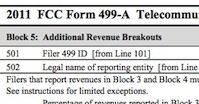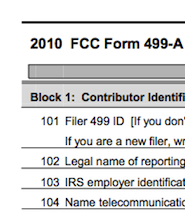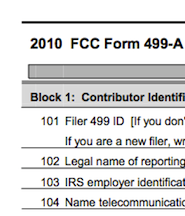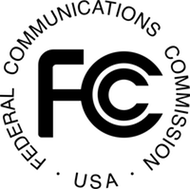Last week, the FCC released its annual report on carrier revenue based on Form 499 filings, this blog’s favorite regulatory worksheet.
And those numbers confirm what we already knew: revenue from voice—both mobile and fixed line—has already plateaued and is coming down fast.
The FCC reported that the total 2009 telecom revenue pot from both end-users and carriers providing services to other carriers dropped to $281 billion from 2008’s $297 billion.
The 2010 FCC numbers, while preliminary, all point to the inevitable and long-predicted slide as the industry transitions to data services.Continue reading


 It’s a slow afternoon here, so I had a little time to consider one mind-numbing regulatory aspect of the growing number of group messaging and conferencing startups.
It’s a slow afternoon here, so I had a little time to consider one mind-numbing regulatory aspect of the growing number of group messaging and conferencing startups.
 I raise my cup of espresso to the FCC for starting the process to reform the Universal Service Fund with the ultimate goal of modernizing a rusting regulatory structure that is not up to task of universal broadband service.
I raise my cup of espresso to the FCC for starting the process to reform the Universal Service Fund with the ultimate goal of modernizing a rusting regulatory structure that is not up to task of universal broadband service.
 After burning off my holiday calories shoveling out of Snowmageddon 2010, I was ready to settle down with a good book and a flagon of mulled cider. Perhaps I was still looking for more Sisyphean exercises, so instead of Harry Potter, I reached for my MacBook and downloaded the FCC’s complete Report and Order in the Matter of Preserving the Open Internet, otherwise known as the Net Neutrality rules.
After burning off my holiday calories shoveling out of Snowmageddon 2010, I was ready to settle down with a good book and a flagon of mulled cider. Perhaps I was still looking for more Sisyphean exercises, so instead of Harry Potter, I reached for my MacBook and downloaded the FCC’s complete Report and Order in the Matter of Preserving the Open Internet, otherwise known as the Net Neutrality rules.
 In case you weren’t at the Web 2.0 Summit earlier this month to hear FCC Chairman Genachowski, O’Reilly has published the interview on YouTube. My Google Reader had already bombarded me with excerpts of Genachowski’s remarks (“net neutrality will happen”) and his unhappiness with the Google-Verizon proposal.
In case you weren’t at the Web 2.0 Summit earlier this month to hear FCC Chairman Genachowski, O’Reilly has published the interview on YouTube. My Google Reader had already bombarded me with excerpts of Genachowski’s remarks (“net neutrality will happen”) and his unhappiness with the Google-Verizon proposal.